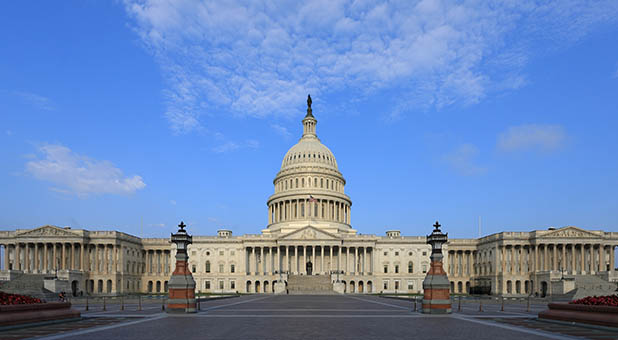Is It Time to Dissolve the Union?
The British will soon vote on leaving the European Union. Americans should follow the British in reconsidering the wisdom of living under a centralized Leviathan in a distant capital, that is, Washington.
The vote on “Brexit” looks to be close. The two sides disagree vehemently over the economic impact of leaving.
There’s also a lively debate over the effect of EU membership on social policy. Some folks, generally more leftish in orientation, like being able to appeal to Europe to override the stodgy British parliament at home. But the majority of Britons are not so happy.
After all, that sacrifices sovereignty and self-government. It doesn’t matter who people are. Most everyone prefers to control their own lives. Yet the U.K. government figures about half of economically significant laws originate in EU legislation.
That’s a major transfer of authority to a body which suffers from a “democratic deficit.” The EU has a top-heavy but fragmented—and unelected—executive. The European Parliament is elected, but only rarely do voters choose representatives based on European issues. So it’s not surprising that many Britons, as well as citizens of most other European countries, feel alienated from Brussels.
The June 23 vote is expected to be close. If the British choose Brexit, other European governments likely will feel popular pressure to schedule similar referenda.
The issue shouldn’t matter much to America. Whether London is in or out, the U.S. will retain its close relationship. A free trade agreement would expand commercial ties.
But Americans should ponder the principles at stake. Washington operates much the same as Brussels, an overbearing Leviathan more interested in regulating and dictating than liberating and empowering. If the United Kingdom would do better outside of the European Union, might not individual and groups of states do better outside of the American union?
Of course, the question was asked and answered 150 years ago. But the attempt to leave was sadly stained by slavery. And the answer was corrupted by a willingness to kill countrymen for wanting to depart.
Admittedly, there are important differences between the USA and EU. Nevertheless, the American nation is large and diverse. At least some of the differences within are as great as differences within Europe.
On a wide range of issues, there’s no reason to impose a national standard. The denizens of Washington, D.C., seem almost uniquely unqualified to decide how people across the nation should live.
Yet over the last century, in particular, power and authority have inexorably flowed into Washington. As a result, people’s liberties and states’ responsibilities have shrunk dramatically. So much for the fabled Land of Liberty.
At the same time, a small bipartisan ruling party has protected its own, profiting mightily irrespective of who formally governs. Abraham Lincoln’s famed “mystic chords of memory” have been strained—and appear ready to snap.
But Washington is more like ancient Rome than Brussels in one important way. Today America’s capital acts like the old imperial city. The national government maintains hundreds of foreign bases, deploys hundreds of thousands of troops overseas, fights endless wars to impose its authority on distant lands, claims even the smallest overseas event to be of vital interest to America, turns prosperous, populous states into military dependents, and attempts to micro-manage events and life in virtually every nation around the globe. There is no sense of limits, no hint of humility, no belief in restraint.
At the same time, Washington has developed its own democratic deficit. The president is elected, to be sure, but most chief executives are re-elected almost irrespective of performance, and claim extraordinary authority in between electoral contests.
Congress also is elected, but most House members have guaranteed themselves near-certain re-election by manipulating the reapportionment process. The Senate re-election rate is only slightly lower. There is only a veneer of democratic accountability.
Indeed, the ability of the bipartisan ruling class to insulate itself from popular sentiment has led to the rise of sometimes ugly populism in both Europe and America. When the mainstream parties refuse to consider public concerns, voters turn to alternative voices.
In the U.S. there are Donald Trump and Bernie Sanders. In Europe a plethora of right-wing and left-wing parties campaign against immigration, the EU, liberalism, globalization, centralization, capitalism and more.
Americans should learn from the British. If the United Kingdom can break free from continental rule, then U.S. states could do likewise. Americans would be better off if they slew Leviathan and started over. It’s time for a vote on Amexit. {eoa}
Doug Bandow is a Senior Fellow at the Cato Institute and a former Special Assistant to President Ronald Reagan.
















































